10 Parental Tips for Teen Internet Addiction
Table of content
- 1. Set clear boundaries
- 2. Seek professional help if needed
- 3. Lead by example
- 4. Create tech-free zones
- 5. Teach digital literacy
- 6. Communicate openly
- 7. Encourage offline activities
- 8. Offer alternative coping strategies
- 9. Set up parental controls
- 10. Monitor online activities
- What is internet addiction?
- How can parents identify teen internet addiction?
- What causes teenage internet addiction?
- How does internet addiction affect teens?
- What are the types of internet addiction?

Teen internet addiction is a behavioral condition marked by teens’ excessive, compulsive, or unrestrained online use. It entails a strong and persistent desire to engage in online activities like social networking, gaming, or browsing, which significantly influences the teen’s life.
The causes of internet addiction in teens include underlying emotional issues, easy access to technology, use of social media, genetic predisposition, peer influence, and lack of offline support.
The different types of teenage internet addiction are online relationship addiction, gaming addiction, net compulsions, information seeking, and cybersex addiction.
Teens who spend too much time online for any reason are at risk of developing an addiction to the internet. In this post, we’ll cover 10 suggestions for parents on how to break internet addiction and engage with the web in a responsible and balanced manner.
1. Set clear boundaries
To set clear boundaries means to establish and communicate reasonable and consistent rules and expectations for internet use that apply to both teens and parents.
By setting clear boundaries, parents can help kids develop self-discipline, reduce internet use, and encourage offline activities, fostering a healthier and more balanced lifestyle.
Boundaries also minimize online addiction. Teens are less likely to become caught in endless browsing or gaming when they have a scheduled internet disconnect time.
2. Seek professional help if needed
Seeking professional help if needed means that if a teen’s internet addiction is serious or has a big effect on their life, their parents should think about getting help from mental health professionals or addiction specialists.
These experts are trained to figure out how bad the addiction is, figure out what’s causing it, and make a personalized treatment plan to deal with the problem.
Teens who are addicted to the internet need to get professional help, especially when self-help techniques or parental interventions aren’t enough. Early help and full support from mental health workers can make it much more likely that the teen will be able to beat the addiction and live a balanced, healthy life.
3. Lead by example
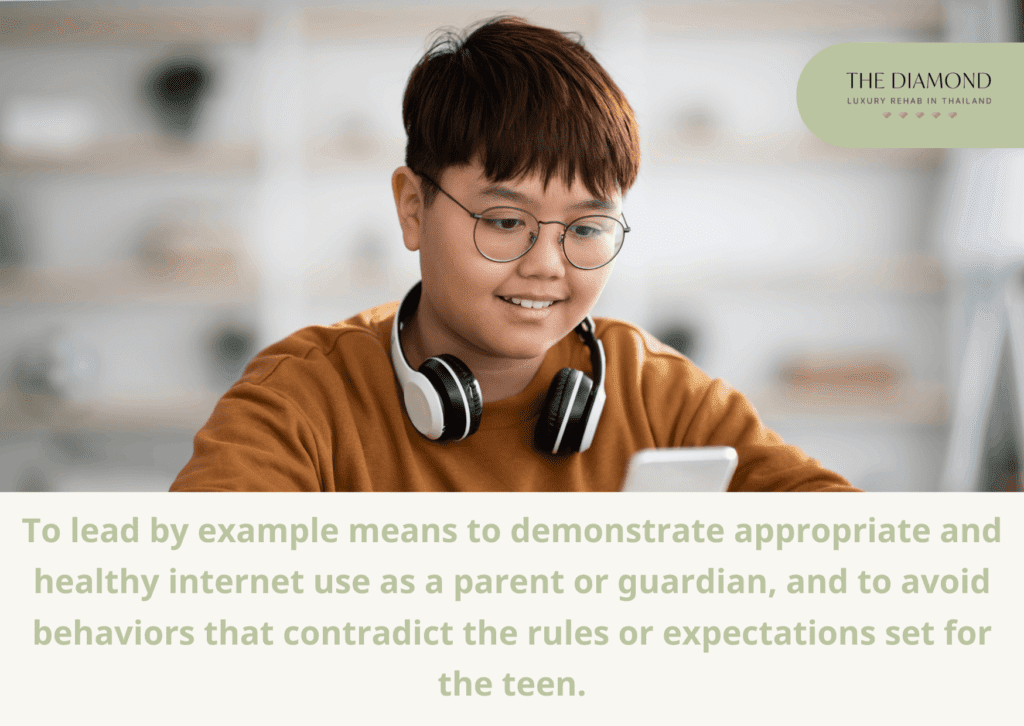
To lead by example means to demonstrate appropriate and healthy internet use as a parent or guardian, and to avoid behaviors that contradict the rules or expectations set for the teen.
Teens can be less likely to become addicted to the internet if adults show them how to use it in a sensible and balanced way. Parents can build trust and communication with their teens by being steady and honest about how they use the internet.
Parents can also encourage their kids to talk about what they do, what they like, and what worries them online, and then listen to them without judging or criticizing them.
4. Create tech-free zones
Creating tech-free zones refers to designating specific areas or times in the home or daily routine where the use of electronic devices, such as smartphones, tablets, computers, and other gadgets, is not allowed.
These zones provide opportunities for individuals, especially teens, to disconnect from technology and engage in offline activities, fostering a healthier balance between their online and real-life experiences.
Tech-free zones promote face-to-face interaction among family members. Without the distraction of screens, teens are more likely to engage in meaningful conversations and build stronger connections with their loved ones.
5. Teach digital literacy
Teaching digital literacy means teaching teens how to use the internet, social media, and other online tools in a responsible and informed way. It entails teaching teenagers critical thinking abilities, online safety, privacy protection, and smart digital navigation.
Teens are more equipped to make informed online decisions, avoid potential dangers, and create healthier internet habits, which can help prevent or manage internet addiction.
6. Communicate openly
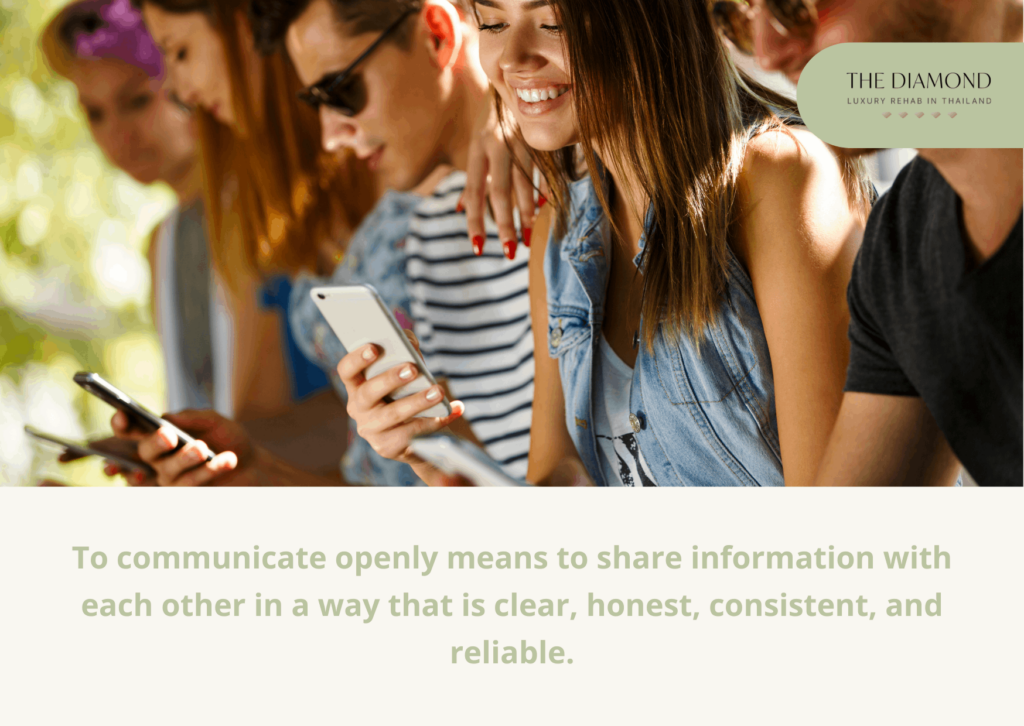
To communicate openly means to share information with each other in a way that is clear, honest, consistent, and reliable, according to a 2022 article titled, “The Value of Open Communication in the Workplace” published in Leaders.com.
In the context of problematic internet use, communicating openly involves fostering an environment of open and honest communication between parents and teens regarding internet use and related concerns.
It also entails creating a safe space for teens to express their thoughts, feelings, and challenges regarding their online activities, while parents actively listen and provide understanding and support. Open communication helps teens feel heard, valued, and less isolated, which can be instrumental in addressing internet addiction.
7. Encourage offline activities
Encouraging offline activities means presenting teens with other things they can do in their free time without the help of technology. It also means to provide opportunities for teens to explore, create, reflect, and socialize in the real world.
Teens who struggle with internet addiction may benefit from off-screen activities that help them relax and unwind after long periods of screen time. Too much time spent online can cause stress, sleeplessness, and anxiety among teenagers.
A 2022 article titled, “Digital Detox or Minimalism – What, Why, and How?” from LinkedIn adds that offline activities can give individuals a break from constant stimulation and help them relax and recharge.
8. Offer alternative coping strategies
To offer alternative coping strategies means to suggest and support different ways of dealing with stress, negative emotions, or challenging situations that do not involve excessive or compulsive internet use.
The use of relaxation techniques, writing, physical activity, talking to a trusted friend, practicing mindfulness, and engaging in creative activities are a few examples of these strategies.
Teens can learn to address their emotions and anxieties in a constructive way by providing alternative coping techniques, minimizing their dependency on the internet as a coping mechanism and lowering the risk of computer addiction.
9. Set up parental controls
To set up parental controls means to use features or software that allow parents to monitor, limit, or block the access of content or activities on various devices, such as phones, computers, tablets, or consoles, that their children use.
Setting up parental controls can help with teenage internet addiction by not only limiting screen time, but also overseeing your teen’s online activities and making sure that the internet is a safe space for them to explore.
10. Monitor online activities
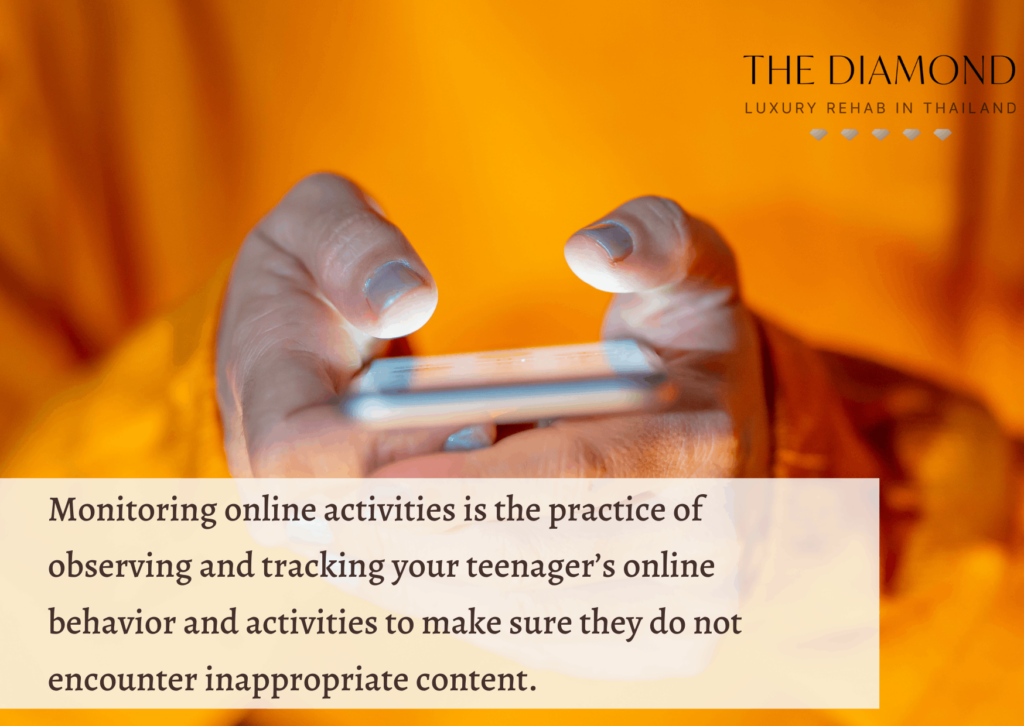
Monitoring online activities is the practice of observing and tracking your teenager’s online behavior and activities to make sure they do not encounter inappropriate content.
Keeping track of someone’s activities in the virtual world can help avoid teens internet addiction by noticing its first signs through early detection of any behavior that indicates problematic internet use. This allows parents to intervene promptly and in a timely manner before the issue escalates.
What is internet addiction?
Internet addiction is defined as a behavioral pattern marked by an overpowering need to engage with the internet in a way that interrupts a person’s everyday life and negatively impairs their physical, emotional, and social well-being.
The Wikipedia entry on internet addiction disorder points out that the World Health Organization, the Diagnostic and Statistical Manual of Mental Disorders (DSM-5), and the International Classification of Diseases (ICD-11) have not classified excessive Internet use as a disorder.
However, the diagnosis of gaming disorder – a subcategory of internet addiction disorder – has been included in the ICD-11.
How can parents identify teen internet addiction?
Parents can identify teen internet addiction by looking out for certain behavioral and emotional signs. Signs that parents should watch for are listed below.
- Preoccupation with the internet: Constantly thinking about being online, feeling anxious or agitated when not connected, and experiencing difficulty in focusing on other tasks.
- Neglecting responsibilities: Neglecting schoolwork, chores, or other obligations in favor of spending more time online.
- Excessive screen time: Spending an unusually large amount of time online, often to the detriment of other activities, responsibilities, or sleep.
- Declining academic performance: A drop in school grades or disinterest in academic pursuits due to excessive internet use.
- Lying or hiding internet use: Being dishonest about the amount of time spent online or attempting to conceal online activities.
- Loss of interest in hobbies: Giving up previously enjoyed hobbies or activities in favor of spending more time online.
- Withdrawal symptoms: Exhibiting signs of irritability, restlessness, or depression when not able to access the internet.
What causes teenage internet addiction?
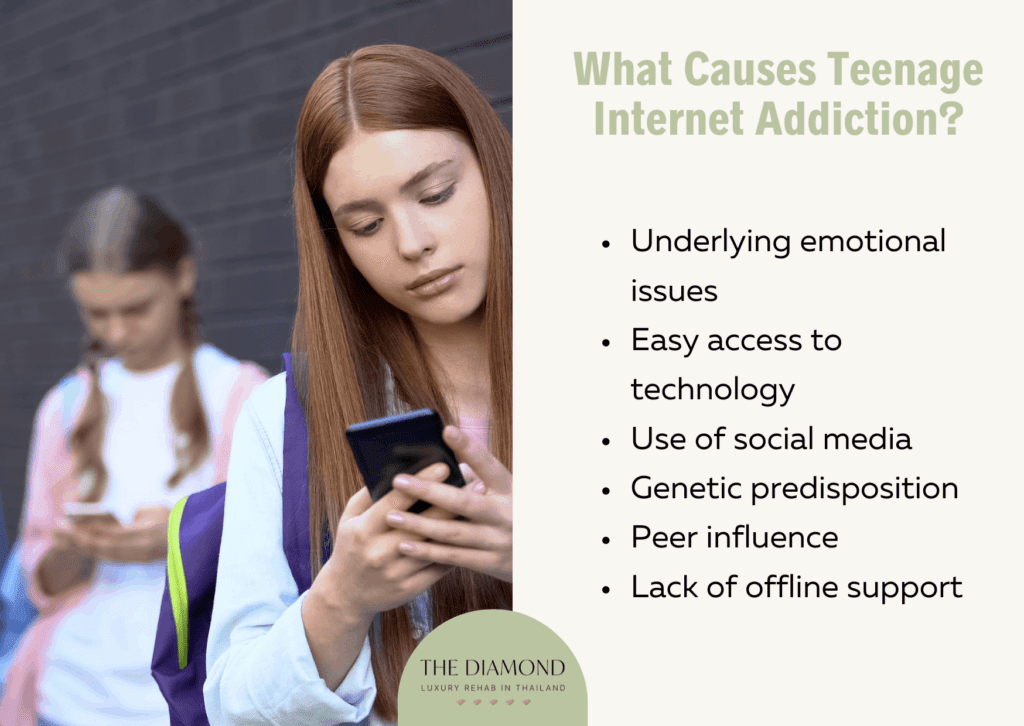
Teenage internet addiction can arise from a combination of various factors. The most common causes of teenage internet addiction are listed below.
- Underlying emotional issues: Some teens may struggle with managing their feelings and impulses, and lack the skills to cope with challenges or setbacks. For these teens, the internet may serve as a coping mechanism or a way to escape from emotional distress.
- Easy access to technology: With the click of a button, you can get a lot of entertainment, social interaction, and knowledge from the internet. Teens might spend more time online than they planned because it’s easy to find interesting things to do.
- Use of social media: Social media platforms offer a constant stream of content, alerts, and interactions, which can be very addicting. Teens may feel like they have to constantly check for changes, answer messages, and look for approval through likes and comments. This can make them feel like they have to stay connected all the time.
- Genetic predisposition: refers to the influence of genetic factors on an individual’s susceptibility to certain traits or behaviors. While genetic predisposition does not directly cause teenage internet addiction, it can play a role in determining a person’s susceptibility or vulnerability to developing addictive behaviors, including internet addiction.
- Peer influence: Adolescents often adopt behaviors that are considered socially acceptable or normal within their peer groups. If internet overuse or excessive social media engagement is prevalent among a teen’s peers, they may feel pressure to conform to these behaviors, leading to increased internet use.
- Lack of offline support: If teenagers feel a lack of emotional support or connection in their real-life relationships, they may turn to the internet as a means of filling the emotional void. Online activities, such as social media interactions or online communities, can provide a sense of belonging and support that they may not experience offline.
How does internet addiction affect teens?
Teens who spend too much time on the internet can have serious problems in many areas of their lives. Internet addiction can affect teens in the ways listed below.
- Social relationships: Excessive internet use can lead to social isolation and strained relationships with family and friends, as teens may prioritize online interactions over real-life connections.
- Poor academic performance: Teens who spend too much time online may neglect their studies in favor of social media and other online pursuits, which can negatively impact their grades.
- Physical health: Prolonged screen time and sedentary behavior can lead to various physical health issues, such as eye strain, headaches, sleep disturbances, and musculoskeletal problems.
- Mental health: A 2012 brief summary of research and practice on internet addiction published in Current Psychiatry Research and Reviews suggests that neurological, psychological, and social issues from Internet Addiction Disorder (IAD) damage people’s lives.
- Risk of online exploitation: Excessive internet use can expose teens to online predators, cyberbullying, and other forms of online exploitation.
- Risk of internet gaming disorder: An unhealthy relationship with the internet can potentially lead to internet gaming disorder, where teens become compulsively involved in online gaming to the detriment of other areas of life.
How does internet addiction affect teens’ mental health?
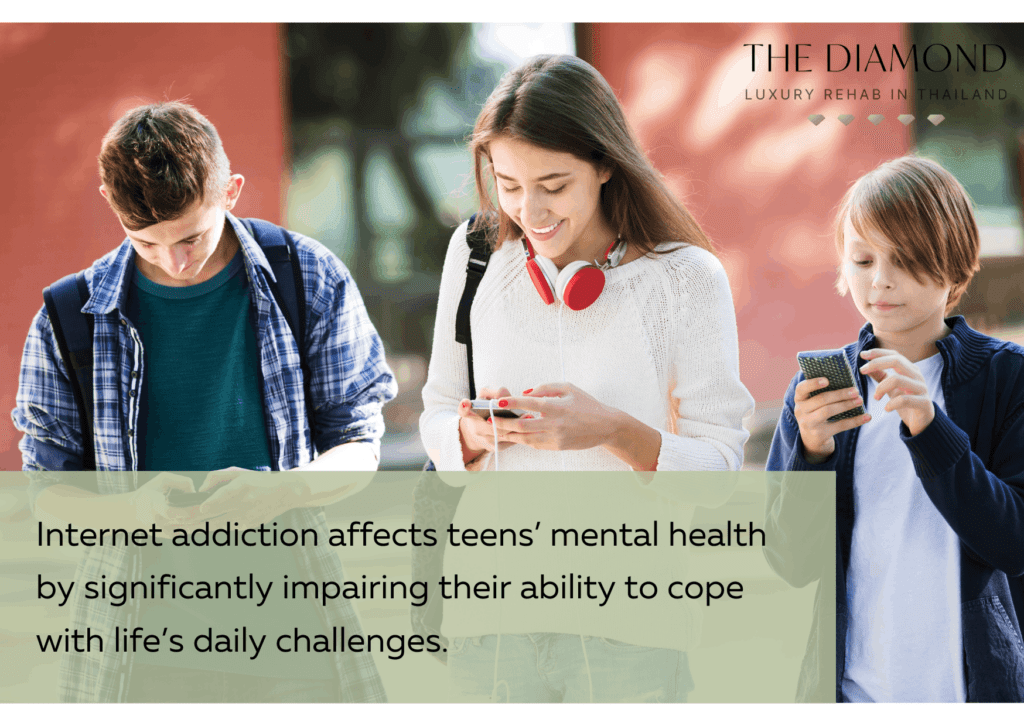
Internet addiction affects teens’ mental health by significantly impairing their ability to cope with life’s daily challenges. Problematic and excessive internet use has been shown to cause and/or exacerbate a number of mental health issues.
In fact, according to a book written by Dr. Kimberly S. Young and published by Wiley in 1998, overusing the internet can lead to a higher level of psychological arousal, which can lead to less sleep, not eating for long periods, and less physical activity. Anxiety, depression, obsessive–compulsive disorder (OCD), and other mental and physical health issues might result from this.
Teens who are hooked to the internet may also suffer from increased stress as a result of neglected tasks such as schoolwork and chores, which can lead to a cycle of procrastination and academic underachievement. The inability to control online habits, as well as withdrawal symptoms from not being able to access the internet, can add to stress.
Constant exposure to online content, especially negative or distressing information, can also contribute to feelings of overwhelm and hopelessness. In fact, according to a 2022 article by Nicholas Aderinto, MBBS published in the International Journal of Surgery: Global Health, there is a clear link between mental health, quality of life, and the extent of one’s internet addiction.
How can excessive internet use by teens affect academic performance?
Excessive internet use by teens can affect their academic performance in several ways. Teens who spend too much time online may become distracted from their academics and wind up procrastinating on tasks or failing to study for tests.
Additionally, not setting limits on internet use can disrupt their sleep, leaving them feeling tired and less able to concentrate during school hours. With less time dedicated to studying and participating in classroom activities, their grades and test scores may start to decline.
Moreover, teenagers who engage in heavy internet use may experience gray matter atrophy and subsequent difficulties with focus and memory, according to a 2011 study on the microstructure abnormalities in adolescents with internet addiction disorder published in PLOS One.
How does internet addiction affect teens’ social lives and relationships?
Internet addiction can affect teens’ social lives and relationships by triggering withdrawal from real-life social interactions, promoting negative social behaviors, and hampering the development of crucial social skills.
Teens who spend an inordinate amount of time online may withdraw from real-life social interactions, preferring the virtual world to face-to-face encounters. As a result of missing out on the benefits of spending time with friends and family, people may experience social isolation and loneliness.
They may become engaged in their online activities rather than engaging in meaningful talks and activities with loved ones, making it difficult to bond and connect emotionally with people.
What are the types of internet addiction?
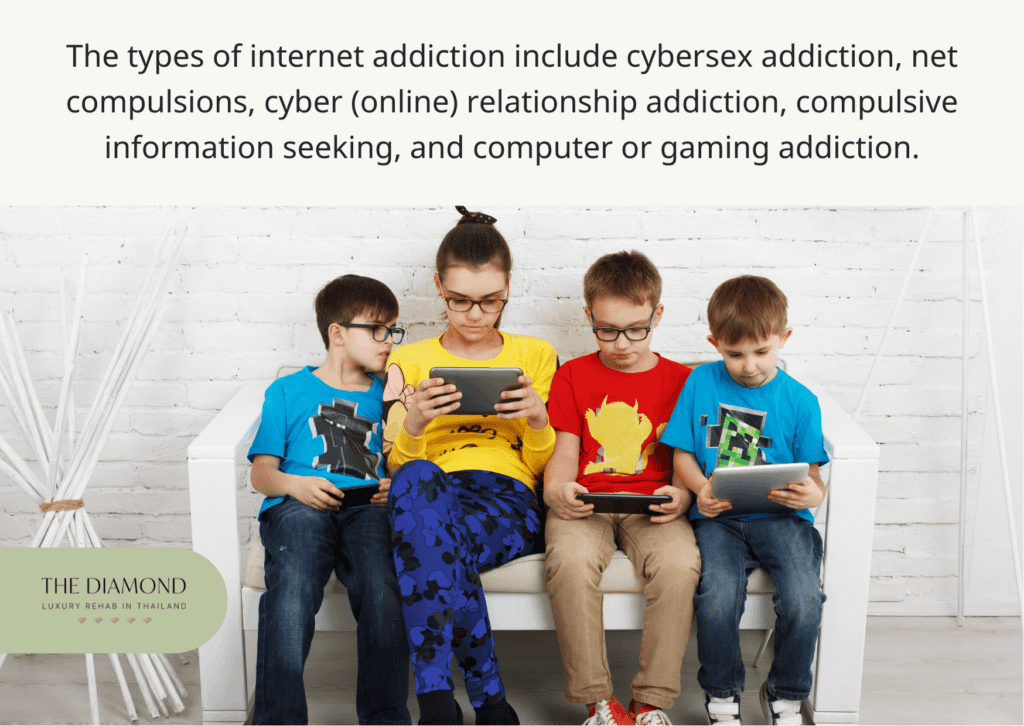
The types of internet addiction include cybersex addiction, net compulsions, cyber (online) relationship addiction, compulsive information seeking, and computer or gaming addiction.
Cybersex addiction is the obsessive consumption of online pornography, sexually oriented chat rooms, or webcam services for sexual pleasure. According to an article titled, “Internet Addiction” from the Addiction Center, a fixation on any of these services can hurt a person’s ability to have sexual, romantic, or close relationships in the real world.
Net compulsions, on the other hand, involves financially and socially destructive virtual behaviors, such as online shopping, internet gambling, and stock trading. These activities are focused on winning and frequently cause relationship and work-related problems for addicts as well, as stated by an article on screen addiction published in Netaddiction.com.
Another form of internet addiction is cyber or online relationship addiction, which is defined as the over involvement in online relationships, including romantic or platonic connections, which may lead to neglect of offline relationships.
Compulsive information seeking can be described as the constant searching for information, news, or updates online, which could result in difficulty disengaging from screens.
Finally, computer gaming addiction is the compulsive engagement in online and offline games, often to the detriment of other responsibilities and real-life social interactions. A 2020 article titled, “The health effects of too much gaming” from Harvard Health Publishing states that gaming has been linked to insomnia, anxiety, depression, aggression, and circadian rhythm abnormalities.
How is internet addiction related to social media addiction in teens?
Internet addiction and social media addiction in teens are closely related, as both involve excessive and compulsive online behaviors that can impact their well-being. While internet addiction encompasses a broader range of online activities, social media addiction focuses specifically on the compulsion to engage with social networking sites.
In the case of teens, the relationship between internet and social media addiction is amplified by the popularity and accessibility of social media platforms. Teens with internet addiction may find themselves drawn to social media as a way to escape from real-life challenges, seek attention, or avoid negative emotions.
Addiction to social networking sites is a subtype of internet addiction, yet both are linked in the lives of today’s teenagers. Both can harm mental health, academic achievement, and social connections.
How is internet addiction related to Facebook addiction in teens?
Internet addiction and Facebook addiction are closely related, especially among teenagers, because social media platforms such as Facebook represent a substantial component of internet use.
Compulsive and excessive Facebook use is a type of internet addiction. While internet addiction refers to a larger spectrum of online behaviors, Facebook addiction is especially related to excessive use of one social networking site.
What are different teen online activities?
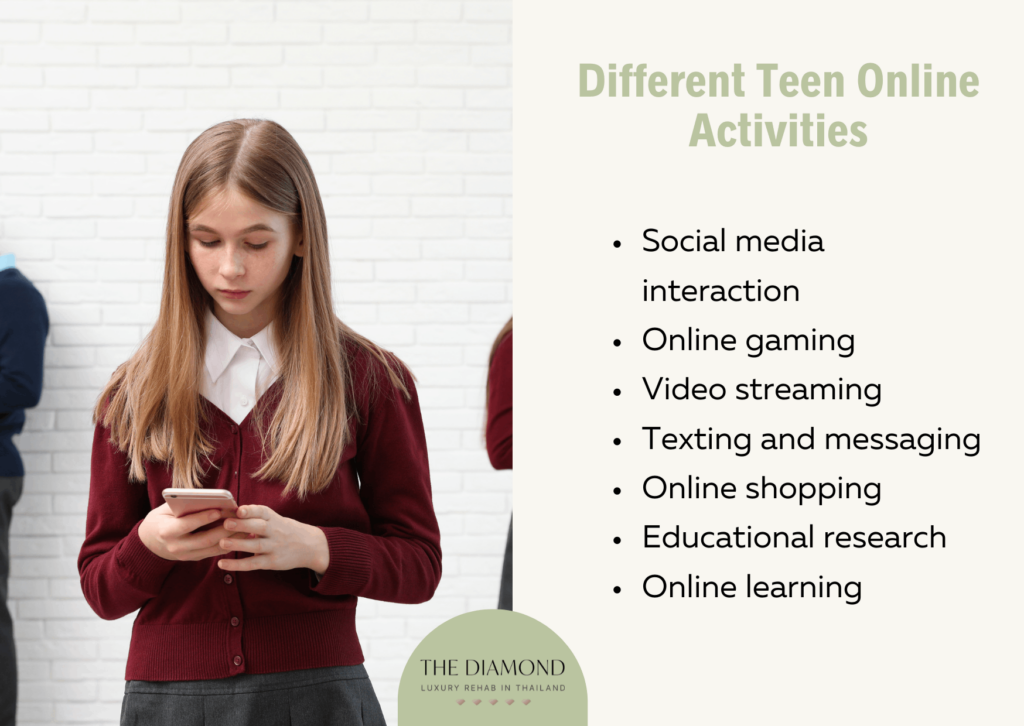
Teen online activities represent a diverse range of online experiences that teens can engage in. The most common teen online activities are listed below.
- Social media interaction: Teens use platforms like Instagram, Snapchat, and TikTok to connect with friends, share photos, videos, and updates about their lives.
- Online gaming: Teens play video games, often with friends or strangers, in multiplayer modes. These games span the genres of action and adventure to simulation and strategy, all of which feature detailed digital environments.
- Video streaming: Teens watch videos on platforms like YouTube. They can access a wide range of content, from educational and entertainment videos to tutorials and vlogs created by individuals and influencers.
- Texting and messaging: Teens communicate with friends and family using messaging apps like WhatsApp or Messenger. They send text messages, emojis, photos, and sometimes make voice and video calls.
- Online shopping: Teens browse e-commerce websites and apps to buy products, from clothing and electronics to accessories and gadgets, typically with the convenience of home delivery.
- Educational research: Using the internet to research information for school assignments or personal interests, accessing articles, websites, and online databases.
- Online learning: Engaging in online courses, webinars, or educational platforms to learn new skills, languages, or subjects of interest.
How long do teens use the internet?
Teens spend almost nine hours a day online, not counting the time they need to do their schoolwork, according to a 2018 article titled, “Social Media and Teens” from the American Academy of Child & Adolescent Psychiatry.
A 2022 survey by the Pew Research Center also states that the proportion of teenagers who say they use the internet almost continuously has increased: 46% of teens say they use the internet almost constantly, up from approximately a quarter (24%) in 2014-15.
What are the dangers of the internet for teens?
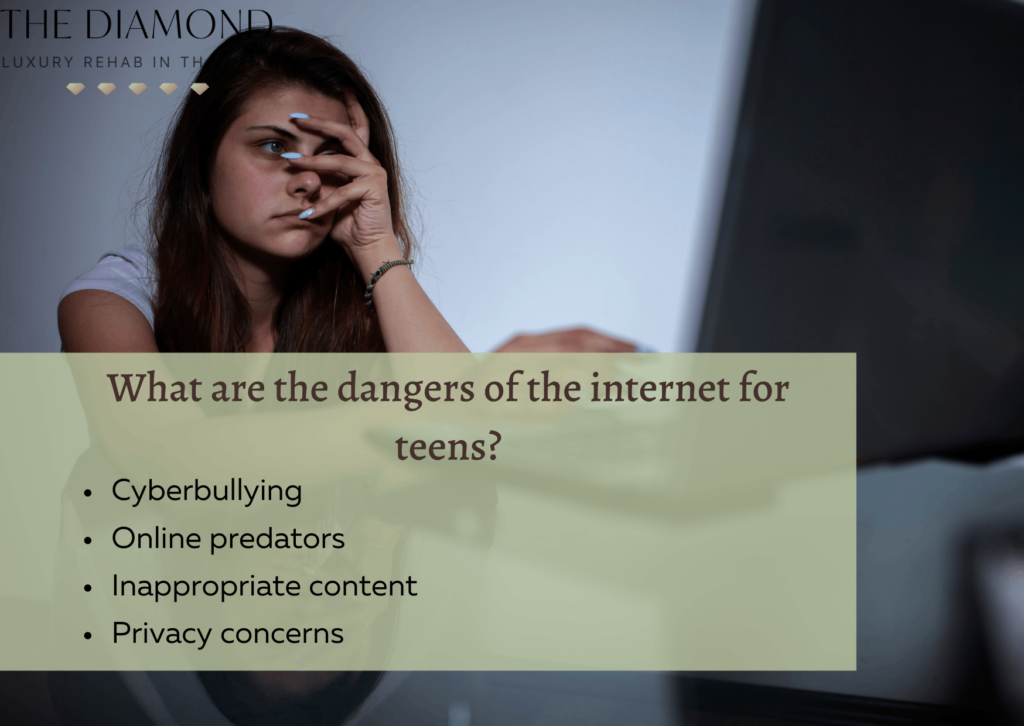
While the internet has numerous benefits for teens, it can also pose dangers that all parents should be aware of. The dangers of the internet for teens are listed below.
- Cyberbullying: Cyberbullies can target teenagers by using online platforms to harass, intimidate, or propagate hurtful content, causing emotional pain and mental health difficulties. According to a 2021 report on how children (10-18) experienced online risks during the Covid-19 lockdown published by the European Commission’s Joint Research Centre (JRC), 44% of children surveyed in 11 European nations who had been cyberbullied prior to lockdown indicated it happened significantly more during lockdowns in 2020.
- Online predators: Strangers with malicious intent may attempt to manipulate or exploit teens through social media, gaming, or chat platforms, putting their safety at risk.
- Inappropriate content: Exposure to explicit, violent, or harmful content online can negatively impact teens’ mental well-being and understanding of appropriate behaviors.
- Privacy concerns: Sharing personal information online without caution can lead to identity theft, stalking, or unwanted attention from advertisers.
- Damaged reputations: Almost anything that someone posts or comments online can stay there forever. These can leave a digital footprint, which can have repercussions for a teenager. For instance, an article about internet safety for kids by Kaspersky states that it’s difficult for teens, in particular, to imagine how a party photo or Snapchat message could pose problems 10 years later when they go for a job interview.

